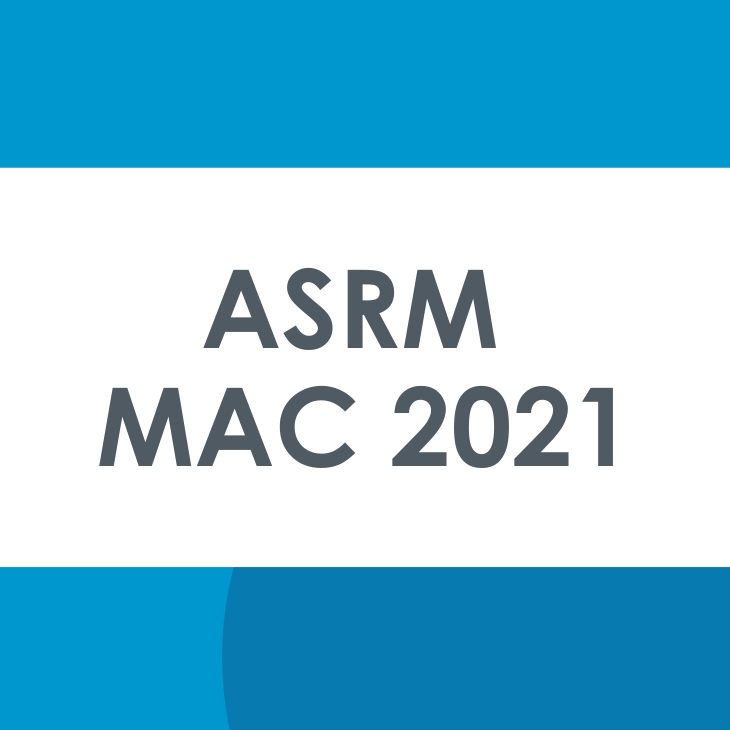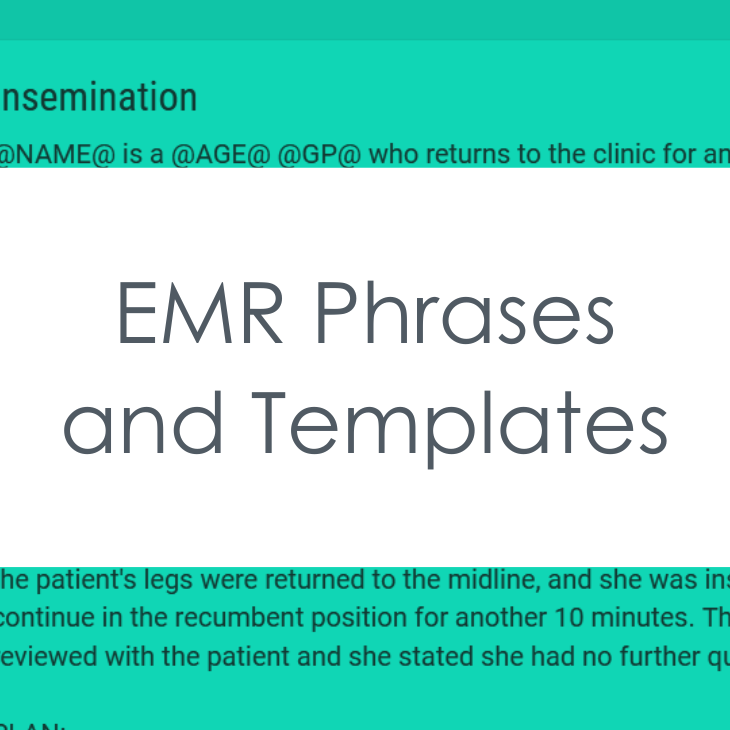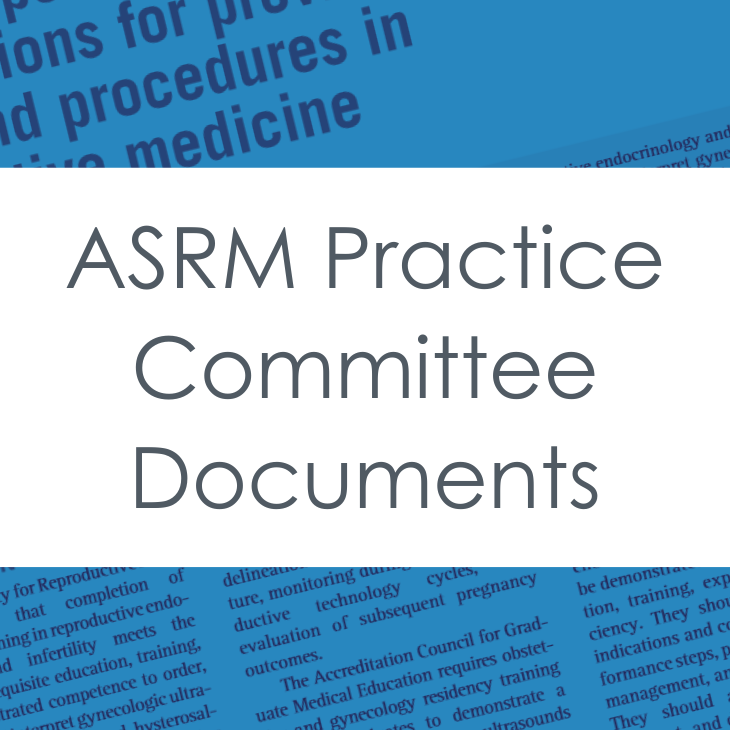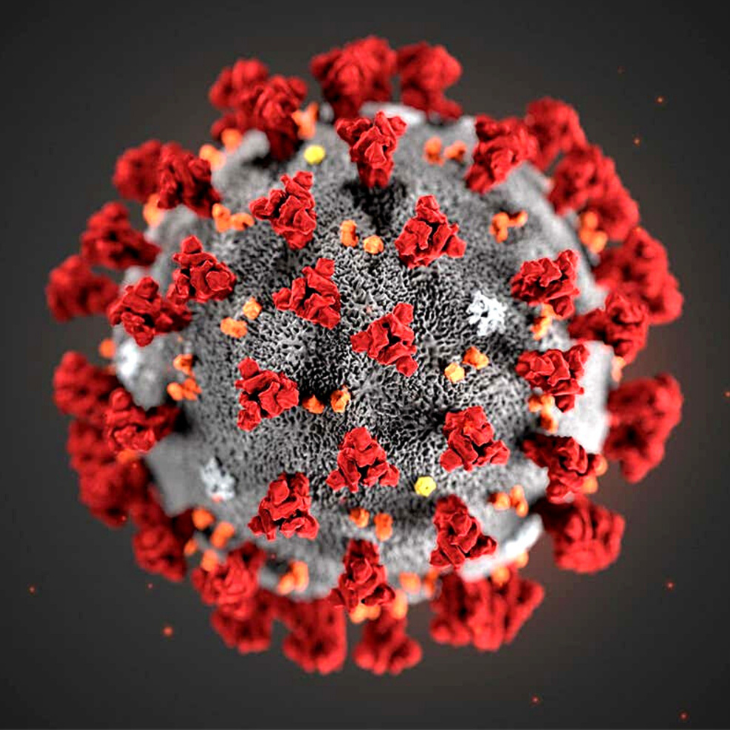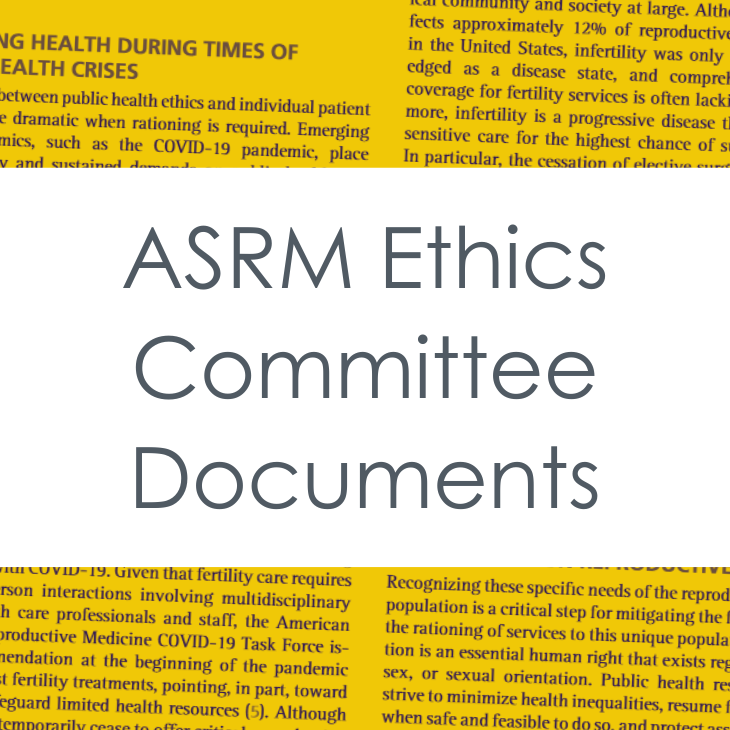
Child-rearing ability and the provision of fertility services: an Ethics Committee opinion
Fertility programs may withhold services from prospective patients on the basis of well-grounded reasons that those patients will be unable to provide minimally adequate or safe care for offspring. This document was reviewed and updated; this version replaces the previous version of this document, last published July 2013 (Fertil Steril 2013;100:50-53). (Fertil Steril® 2017;108:944–7. ©2017 by American Society for Reproductive Medicine.)
Download a PDF of this document
Download a PDF of this document
KEY POINTS
- Fertility programs may withhold services from prospective patients on the basis of well-grounded reasons that those patients will be unable to provide minimally adequate or safe care for offspring.
- Fertility programs may provide services to prospective patients who would benefit from medical treatment except when significant harm to a future child is likely.
- Fertility programs should develop written procedures for making a determination to withhold services when there are concerns about the childrearing capacities of prospective patients.
- A program's assessment of a patient's inability to care for a child or potential to cause harm to a child should be made jointly among members of the program and, if indicated, consultation with appropriate other professionals (for example, with a mental-health professional), and should be documented.
- Persons with disabilities should not be denied fertility services on the basis of disability.
Providers of infertility services are sometimes faced with patients who do not appear to be well situated to provide safe or adequate care for children. Treating these patients may lead to the birth of a child who is reared by parents who are psychologically unstable, abuse drugs, may abuse the child or the other parent, or present other risks to the well-being of the child. Accurate predictions about parental child-rearing ability are not easily made, and personnel in fertility programs may not feel equipped to make them. This poses an ethical dilemma in which clinicians must weigh the potential interests of future offspring against the needs and desires of infertile patients. The aim of this opinion is to provide guidance to fertility programs in such circumstances to facilitate each program's individualized decision-making. It addresses whether cliniciansmust provide services to persons whom they suspect might not be able to provide adequately for the child's welfare, or whether clinicians have an ethical obligation not to provide these services. This opinion also discusses the extent to which a clinician's own ethical views of minimally acceptable child-rearing and possible responsibility for the future child may be taken into account in appropriately deciding whether to accept a patient for infertility treatment.
THE NATURE OF THE DILEMMA
Fertility specialists provide services that treat or bypass medical and nonmedical problems that interfere with the ability to have children. Fertility specialists ordinarily focus on medical aspects of the situation. Except in third-party reproduction, psychological screening or consultation with patients generally does not occur. Attention focused on the home or rearing situation of children born as a result of treatment is not common.As with persons who reproduce without assistance, no systematic screening of patients seeking fertility services to investigate their ability or competency in rearing children has traditionally occurred or been thought to be appropriate, as would ordinarily occur in adoption. The desire to reproduce prompts a wide variety of individuals to seek infertility treatment, including subcategories of patients for whom questions of childrearing ability might legitimately arise. For example, while infrequent, many programs have had treatment requests from persons who have a history or current evidence of uncontrolled or untreated psychiatric illness, substance abuse, violent or criminal behavior, child abuse, previous loss of parental rights, or ongoing partner abuse. These factors and others may lead a fertility program to question whether such patients are likely to cause significant harm to a future child.
Concerns about child-rearing abilities of patients present a dilemma for fertility programs. As providers of medical services, programs do not routinely evaluate the child-rearing ability of their patients or conduct home studies as adoption agencies do, nor has it been thought their role to do so. There is no existing child to be placed for adoption and thus no need for the home studies and the scrutiny that occur in adoption. Medical factors have been the key determinant of whether treatment will be provided; some physicians argue that this should be the only consideration in deciding whether to provide services (1).
Fertility programs, however, are not totally removed from social and psychological considerations in providing treatment. Programs may obtain social or psychological history information from patients, either via intake forms or through conversations that occur during the course of treatment. Programs may require patients to meet with a counselor. Such counseling has become routine for patients using donor gametes and embryos or gestational carriers. Even though fertility programs do not seek to assess parenting adequacy specifically, pretreatment medical evaluation of patients might reveal potential problems, such as uncontrolled psychiatric illness, a history of child or spousal abuse, or substance abuse. In such situations, some programs and providers may be reluctant to proceed with treatments, either out of concern about their role in helping patients become parents who may be potentially harmful to their child or because of fears of legal liability. At the same time, practitioners may feel that they are not competent to make such predictions and should not be required to do so. Providers also may feel that it is necessary to respect the right of persons to have children if they so choose and to avoid charges of unlawful or improper discrimination in withholding services from them.
The problem is complicated because many interests are involved. The interest of future children having a safe home environment and minimally competent rearing parents must be reconciled with the interest of infertile persons receiving the treatment services they need to reproduce versus the provider's own sense of moral responsibility in deciding which patients to treat.
RECONCILING THE INTERESTS
We analyze below the interests of offspring, infertile persons, and providers of fertility services.It is difficult to reach optimal solutions for all situations, but the Committee believes that fertility programs should be attentive to the potential for serious child-rearing deficiencies in their patients. If they have a substantial, non-arbitrary basis for thinking that parents will provide inadequate or unsafe child-rearing, they should be free to refuse to provide treatment services to such patients. Because of the difficulty of making judgments reliably, however, clinicians should deny services only after investigation shows that there is a substantial basis for such judgments. In reaching such conclusions, it is imperative that programs not engage in prohibited or unjust discrimination. Given the great importance of procreation, infertile persons should not be denied services without a thorough review and determination jointly made by members of a multidisciplinary treatment team. However, fertility providers are not morally obligated to refuse services in all cases in which there might be a question about risk to the child. It is very difficult to make such complex judgments about potential future risk to offspring. Some will prefer to proceed with treatment, giving greater weight to the parents' desire to reproduce. Also, programs may adopt a written policy that they will provide fertility services to all persons who qualify medically except when significant harm to future children is likely.
The Welfare of Offspring
Entwined with the child-rearing ability of fertility patients are questions about the welfare of future offspring and the duty of prospective parents and those aiding them to avoid situations that may jeopardize child welfare. Helping parents achieve the birth of a child could be considered a morally worthwhile endeavor. The provision of reproductive treatments, unlike childbirth in unassisted reproduction, permits contemplation by third parties of the possibility of risks or harm to offspring born to a particular set of parents.Many persons have argued that the well-being of offspring should be the primary consideration in determining whether medical services should be provided to treat infertility. Indeed, the Human Fertilisation and Embryology Act, setting up a regulatory authority for assisted reproductive technology in the United Kingdom, made this consideration explicit. It stated that treatment services should not be provided unless account has been taken of the welfare of any child who may be born as a result of treatment (2).
The well-being of offspring is an overriding ethical concern that should be considered in determining whether to provide infertility services. Respecting the interests of children in the context of infertility, however, poses an ethical paradox. In most instances, decisions about whether to provide a treatment will determine whether a child will be born at all, not whether the child will be born into a safe environment. In such cases, the only way to protect the child from the risks of concern would be to avoid its birth altogether.
A large body of philosophical and bioethical literature discusses the issue of harm to offspring from the very conditions of their conception or birth (3–11). Some commentators have concluded that unavoidable ‘‘harm’’ to a child from assisted reproduction can never be a valid reason to withhold services (3, 11). However, such a judgment takes too narrow a view of the relevance of offspring welfare in determining ethical conduct. Although a child may not, strictly speaking, be ‘‘harmed’’ as a result of fertility procedures that made its birth possible, concerns about future harm to offspring may be validly taken into account when making ethical assessments about those treatments. For some persons, the potential harm to the child alone is sufficient to justify this conclusion. Others might point to the significant costs and burdens that parental unfitness potentially imposes on the larger society.
Denying fertility services to those who might harm a child is not an easy judgment, and providers or policymakers should be very cautious in making such decisions. A wide range of parenting approaches or home environments are compatible with a child thriving and having a meaningful life, and persons having a rich and responsible parenting experience. The parents' prospective child-rearing would have to raise concerns regarding child protection and represent a very large deviation from a ‘‘good enough’’ home for concerns about the welfare of offspring to be relevant to ethical assessment or policy choice. Such assessment should be thorough and defensible after careful consideration of relevant factors.
The Interests of Infertile Persons
Another important consideration in assessing this issue is the interest of infertile patients in receiving services that will enable them to reproduce. Fertile persons have constitutional rights to have and rear children that the state cannot restrict except in extreme cases of harm. Indeed, persons with severe mental illness or developmental disability are protected against compulsory sterilization or contraception even when reproductive decisions may be rightly regarded as irresponsible or wrong. Infertile persons have the same rights and interests in reproducing as do fertile persons, and they should not be denied parenthood merely because they are infertile. Reproductive rights protected under the United States and state constitutions are rights against state interference, not rights to have physicians or the state provide requested services. In addition, constitutional rights protect individuals against interference or discrimination by government or governmental entities, but such protections usually do not extend to the behavior of persons in medical practice in the private sector. Federal and state anti-discrimination laws, however, do ban certain kinds of private sector discrimination in decisions to treat patients that largely focus on demographic features such as race, national origin, ethnicity, religion, sex, disability, sexual orientation, and gender identity (12). As long as the private-sector physician does not impermissibly discriminate under these laws, he or she may choose not to accept a fertility patient without violating that person's constitutional rights. While there is great dispute about what will count as a sufficient justification for governmental restrictions on reproduction, physicians might legitimately, when a clear case of a substantial risk of harm to offspring is shown, choose not to provide services that make such a birth or rearing situation possible.As noted, such judgments may be difficult to make or support except in the clearest cases. Because of the importance of reproduction, judgments to deny treatment should be made only when there is a strong and substantial basis for doing so. In making them, providers should pay special attention to treating equally persons with disabilities who request fertility services. Persons with disabilities are able to rear children, and should not be disqualified from doing so merely because of their disability (13). The federal Americans with Disabilities Act, which applies equally to governmental and private-sector fertility clinics, prohibits denying persons with disabilities access to infertility services if the denial is based on ill-founded doubts or stereotypes about their ability to rear and parent (14).
Provider Autonomy
An important difference between reproduction by fertile and infertile persons is that fertile individuals do not need the help of physicians to become pregnant. Persons who seek the assistance of a physician to reproduce necessarily involve the physician in the outcome that they seek. Requests for reproductive assistance thus also raise the question of whether physicians are obligated to treat all patients who seek their services. Although there is a strong presumption in favor of an obligation to treat all persons in need, physician and professional autonomy is also an important value. Ordinarily, both parties are free to decide whether to enter into a doctor-patient relationship and, once in it, whether, with adequate notice to the patient, to terminate that relationship. Unless the conditions of their employment require otherwise, physicians providing fertility services are generally free not to provide services to individuals as they choose, subject only to federal and state laws that prohibit discrimination on statutorily enumerated grounds.Regarding the limits of provider autonomy when decisions about whether to treat are based solely on patient sexual orientation, gender identity, or marital status, treatment denials are inappropriate in part because the data that show child-rearing and offspring welfare outcomes are similar to those achieved in traditional family structures (15, 16). Even when patients seem at elevated risk of being unable to provide safe or adequate care for children, individualized assessments are required to avoid applying unjustified inferences from group characteristics to individuals.
Physicians faced with individuals or couples who create significant concerns about the safety of a potential child may have very good reasons for choosing not to treat them. Precisely because fertility services could result in a child, physicians may reasonably believe that they have a moral responsibility for the situation of the resulting child and choose not to help bring about such an outcome. If they take that view and do not deny treatment solely on the basis of disability or other impermissible factor, they may take the welfare of resulting children into account in deciding whether to provide services.
By the same token, some providers may believe that they have an obligation to treat all patients who would benefit from medical treatment and should not be required to assess a patient's child-rearing abilities or other child-welfare concerns. This too is a reasonable position, except when significant harm to a future child is likely. Physicians and providers with this treatment philosophy should be free to accept persons for treatment as long as they have a reasonable basis for thinking that the child will not suffer significant harm from being raised by these parents. Professional autonomy thus has two aspects. It entitles physicians to choose not to treat persons whom they think will be inadequate child-rearers (as long as they comply with antidiscrimination laws). It also generally entitles them to treat such patients if they choose.
RECOMMENDATIONS
Offspring welfare is a valid consideration that fertility programs may take into account in accepting patients and providing services as long as they do not discriminate on the basis of disability or other impermissible factors. However, it does not follow that physicians are morally obligated to withhold such services, except when significant harm to future children is likely. Physician autonomy entitles physicians to provide medical services if they choose, but they are not usually obligated to do so. While practitioners and clinics may—except in the case of impermissible discrimination—make their own moral decisions about whether to accept individuals as patients, their decisions should be based on empirical evidence, not stereotype or prejudice. For example, they should not assume that a history of social or psychological problems or presence of a serious disability automatically disqualifies someone from being a capable rearing parent.A decision to deny treatment to patients who raise child-protection concerns calls for careful inquiry and should be dependent on evidence. To aid in the process, fertility programs should develop explicit policies or procedures for handling such situations. Written policies might address such matters as the information and evaluation that will be required of potential patients and what conditions would preclude medical treatment for infertility (for example, uncontrolled or untreated psychiatric illness, substance abuse, a history of or ongoing physical or emotional abuse, or a history of perpetrating physical or emotional abuse). Programs also should establish a procedure for making and documenting such assessments when questions about the child-rearing adequacy of potential parents arise. This might involve evaluation by a mental-health professional and consultation with other experts culminating in a group assessment or review prior to a final determination.
Acknowledgments:
This report was developed by the Ethics Committee of the American Society for Reproductive Medicine as a service to its members and other practicing clinicians. While this document reflects the views of members of that Committee, it is not intended to be the only approved standard of practice or to dictate an exclusive course of treatment in all cases. This report was approved by the Ethics Committee of the American Society for Reproductive Medicine and the Board of Directors of the American Society for Reproductive Medicine.The following members of the ASRM Ethics Committee participated in the development of this document. All Committee members disclosed commercial and financial relationships with manufacturers or distributors of goods or services used to treat patients. Members of the Committee who were found to have conflicts of interest based on the relationships disclosed did not participate in the discussion or development of this document.
Judith Daar, J.D.; Jean Benward, M.S.W.; Lee Collins, J.D.; Joseph Davis, D.O.; Owen Davis, M.D.; Leslie Francis, Ph.D., J.D.; Elena Gates, M.D.; Elizabeth Ginsburg, M.D.; Susan Gitlin, Ph.D.; Sigal Klipstein, M.D.; Laurence McCullough, Ph.D.; Richard Reindollar, M.D.; Ginny Ryan, M.D.; Mark Sauer, M.D., M.S; Rebecca Sokol, M.D., M.PH; Sean Tipton, M.A.; Lynn Westphal, M.D.
REFERENCES
- 1. Gurmankin AD, Caplan AL, Braverman AM. Screening practices and beliefs of assisted reproductive technology programs. Fertil Steril 2005:61–7.
- Human Fertilisation and Embryology Act of 1990. In: . In: Morgan D, Lee RG, editors. Blackstone's guide to the Human Fertilisation& Embryology Act 1990. London: Blackstone Press Limited; 1991:194.
- Heyd D. Genethics: moral issues in the creation of people. Berkeley: University of California Press; 1992.
- Coleman CH. Conceiving harm: disability discrimination in assisted reproductive technologies. UCLA L Rev 2002;50:17.
- Peters PG Jr. Protecting the unconceived: nonexistence, avoidability, and reproductive technology. Ariz L Rev 1989;31:487–558.
- Brock D. The non-identity problem and genetic harms—the case of wrongful handicaps. Bioethics 1995;9:269.
- Parflt D. On doing the best for our children. In: . In: BaylesMD, editor. Ethics and population. Cambridge: Schenkman; 1976.
- Green RM. Parental autonomy and the obligation not to harm one's child genetically. J Law Med Ethics 1997;25:10.
- Steinbock B, McClamrock R. When is birth unfair to the child? Hastings Cent Rep 1994;24:15.
- Cohen CB. The morality of knowingly conceiving children with serious conditions: an expanded ‘‘wrongful life’’ standard. In: . In: Fotion N, Heller JC, editors. Contingent future persons. Boston: Kluwer Academic Publishers;1997:33.
- Roberts M. Child versus childmaker: future persons and present duties in ethics and the law. Lanham: Rowman & Littlefleld; 1998.
- Robertson JA. Procreative liberty, harms to offspring, and assisted reproduction. Am J Law Med 2004;30:7–40.
- National Council on Disabilities. Rocking the cradle: Ensuring the rights of parents with disabilities and their children, Available at: https://www.ncd.gov/publications/2012/Sep272012; 2012.
- Americans with Disabilities Act, 42 U.S.C. x 12102 (1990), amended by the Americans with Disabilities Amendments Act, Pub. L. No. 110–325(2008).
- Ethics Committee of the American Society for Reproductive Medicine. Access to fertility treatment by gays, lesbians, and unmarried persons. Fertil Steril 2013;100:1524–7.
- Ethics Committee of the American Society for Reproductive Medicine. Access to fertility services by transgender persons. Fertil Steril 2015;104:1111–5.
Topic Resources
View more on the topic of infertility
Topic Resources
View more on legal/ethical issues
Ethics Opinions
Ethics Committee Reports are drafted by the members of the ASRM Ethics Committee on the tough ethical dilemmas of reproductive medicine.

Family members as gamete donors or gestational carriers: an Ethics Committee opinion (2024)
The use of adult intrafamilial gamete donors and gestational surrogates is ethically acceptable when all participants are fully informed and counseled.
Financial ‘‘risk-sharing’’ or refund programs in assisted reproduction: an Ethics Committee opinion (2023)
Financial ‘‘risk-sharing’’ fee structures in programs charge patients a higher initial fee but provide reduced fees for subsequent cycles.
Planned oocyte cryopreservation to preserve future reproductive potential: an Ethics Committee opinion (2023)
Planned oocyte cryopreservation is an ethically permissible procedure that may help individuals avoid future infertility.

